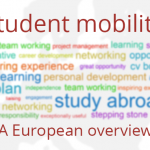 Educause is starting next week. I will be there and, like any serious participant, I have started to prepare my schedule. Well, as you know, I am interested by anything about MOOCs but using this word, as a keyword did not return one single suggestion! Does it mean that the movement has gone? No more tsunami? Well, that is certainly not true. MOOC is a strange beast, which is hidden in many corners. Let us pope out the game from the wood! An accumulation of new information drives me to come back on an old subject: the appearance of new business models for MOOCs. It is emerging in the United States, and it is beginning to impact the universities. The movement started earlier this year and it is accelerating rapidly.
Educause is starting next week. I will be there and, like any serious participant, I have started to prepare my schedule. Well, as you know, I am interested by anything about MOOCs but using this word, as a keyword did not return one single suggestion! Does it mean that the movement has gone? No more tsunami? Well, that is certainly not true. MOOC is a strange beast, which is hidden in many corners. Let us pope out the game from the wood! An accumulation of new information drives me to come back on an old subject: the appearance of new business models for MOOCs. It is emerging in the United States, and it is beginning to impact the universities. The movement started earlier this year and it is accelerating rapidly.
The consortium of public universities in Arizona, ASU, initiated this important move. It is now possible to achieve the first year degree through a set of EdX MOOCs. Students are not free to choose their own MOOCs but must follow a set of courses depending on the disciplines taught at ASU. Students, who have successfully achieved (and paid) the certifications for all the MOOCs in their list, may submit their results to transform it in an ASU first year grade for 6000$ only, which is cheap by American standards.
The novelty is twofold: getting a real university degree through selected certifications by EdX and also to pay the registration in the university if successful only. The cost of the certifications must be added but the total expense remains quite low compared to that of a conventional registration. For those who do not go to the end and could not turn them into a real degree, the financial loss is acceptable. In a country where the cost of Higher Studies skyrocketed, the guarantee is more than valuable: the success rate in the US is not much better in the US than in Europe.
Second example: Champaign University in Illinois, which offers a complete MBA, following the same model. Adding the cost of given Coursera specializations (Coursera specializations are sets of predefined MOOCs), which remains modest, a payment of $ 20,000 to the university and you may obtain a real diploma. This is really a deal for those who cannot afford the luxury of MBA at $ 60,000 or more!
The MIT is not left behind, which just announced the availability of a “micro master” as a set of EdX MOOCs, corresponding to the first semester of the Master “Supply Chain Management”. If accepted students may then apply to follow the second semester face-to-face for the full diploma.
Closer to home, in Switzerland, EPFL offers comprehensive remote education and training to qualify for a diploma, based on its MOOCs from Coursera and EDX. In France, a few Higher Education Institutions deliver ECTS together with the certications for their MOOCs. However, to my knowledge, these ECTS cannot be used as parts of degrees in other institutions, thus it is of limited interest. I am not aware of what is going on in other European countries and I would be delighted to learn more about.
The signal is very strong: it is now possible, in the US, to obtain a degree, starting with MOOCs; it allows to reduce the cost of Higher Education and the total payment is due in case of success only. Does this will suffice to reduce the cost of education to an acceptable level remains to be proven.
What can be the impact in Europe? Does it will shake up the methods of awarding diplomas?
In many European countries, students and their families do not directly support the real cost of education thus using MOOCs to decrease the fees might not of big interest. But this is not true everywhere, especially in business schools. Moreover, these schools already compete, at an international level, to attract the best students. Thus these institutions may become the first to adopt these new models.
Selective institutions may pay special attention to students having followed some MOOCs prior to their application. They may offer all kind of facilities to these students: grants, exemption for some modules, accelerated studies… This would enable them to master their costs and attract a new audience who would not, otherwise, pay attention at them. They may offer their own MOOCs or a selection of MOOCs assembled together by consortia of institutions. The start-up investment, to build these MOOCs, is significant but remains reasonable if schools regroup around common certifications.
For the universities, with low level of tuition fees and limited financial assets, the impact is less obvious. However, I am convinced that, imagination helping, they will find new ways to use MOOCs for the best. For example, when enrolling students in high demand sectors they may reduce the pressure in the lecture halls, exempting those students who have previously obtained a certification in the same matter. One can also imagine variable geometry curriculums. The new entrants could be offered a curriculum taking into account previously acquired certifications. Those demonstrating higher skills may be offered faster curricula.
MOOCs could quickly become a means for guiding and driving students into the sectors of their choice. A clever use of selected MOOCs may become an intelligent method to adapt the studies to the desires of the students.
The MOOCs revolution is also perhaps there: a means to direct and guide students at the beginning of their journey in Higher Education and allow them to choose their own way.










